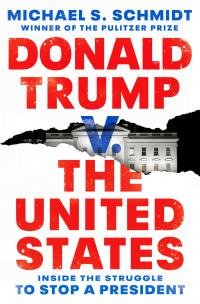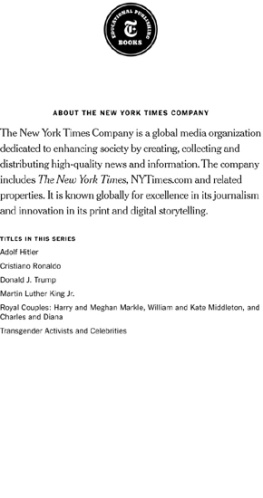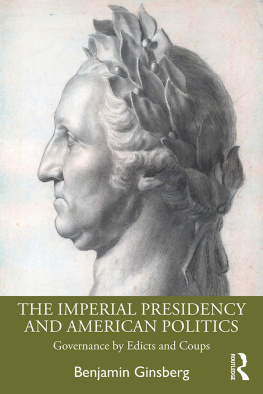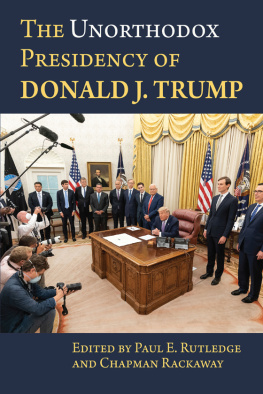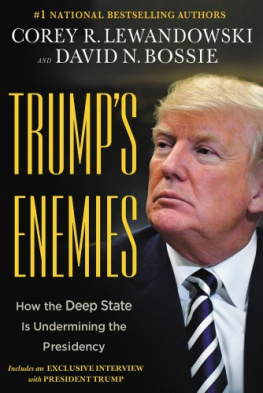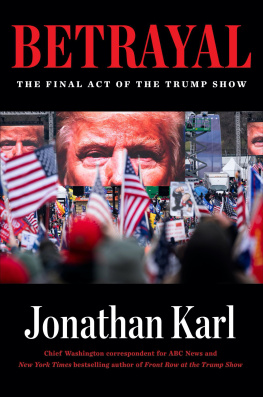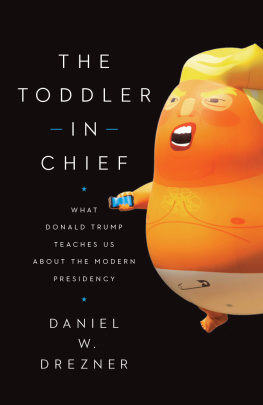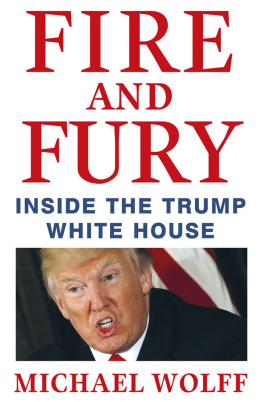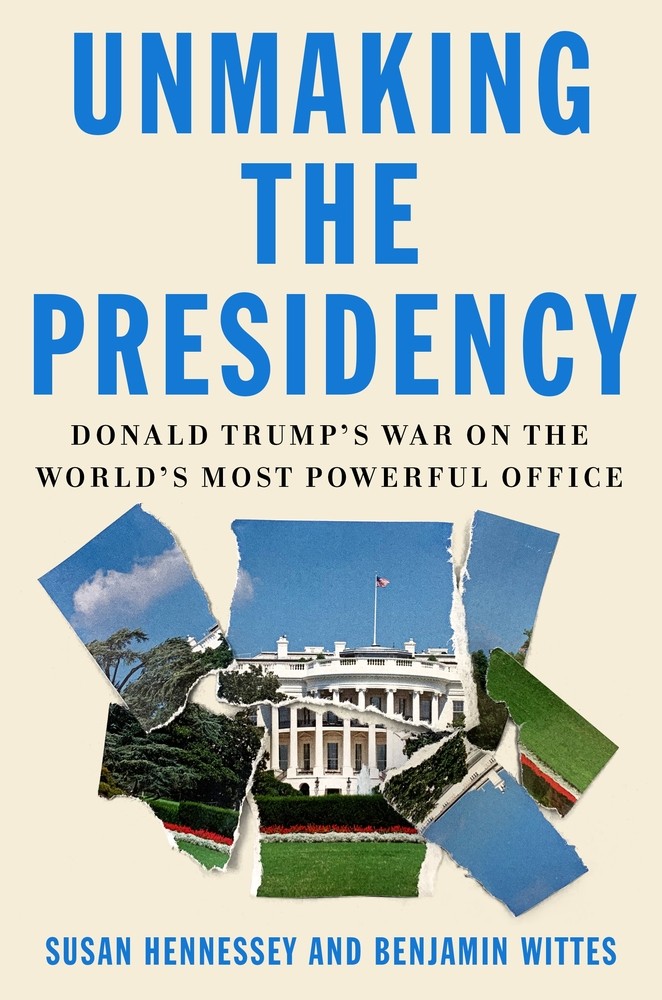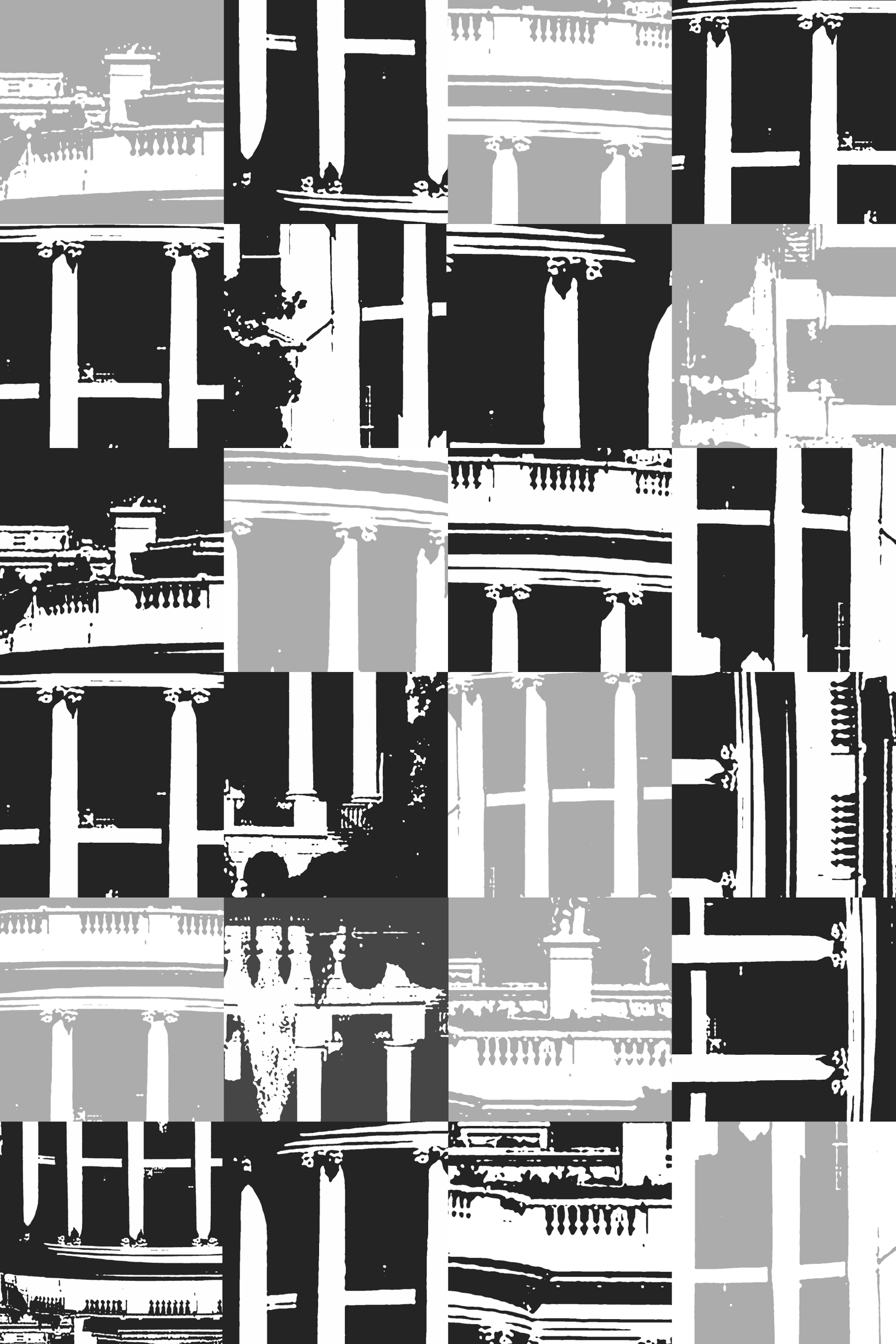The author and publisher have provided this e-book to you for your personal use only. You may not make this e-book publicly available in any way. Copyright infringement is against the law. If you believe the copy of this e-book you are reading infringes on the authors copyright, please notify the publisher at: us.macmillanusa.com/piracy.
The steel-gray skies on the morning of January 20, 2017, opened now and then for the occasional drizzle of rain. It was not the worst weather that had afflicted a presidential inauguration. At William Howard Tafts inauguration, a snowstorm forced the entire ceremony indoors. By contrast, the temperature the day that Donald J. Trump became the forty-fifth President of the United States reached a comparatively balmy 49 degrees. Yet the inaugural parade route, typically filled to capacity with well-wishers, had only sparse crowds, and empty bleachers lined Pennsylvania Avenue. Cameras broadcast the scene around the world as commentators narrated the days events in hushed and somber tones more befitting a state funeral than the dawn of a new presidential administration.
The scene on the Capitol dais was undeniably strangesome weird shit, as former president George W. Bush reportedly called it as he left the stage when it was all over. It was strange even before the newly inaugurated president began speaking of American carnage in his first address in that capacity. As is the custom, the living former U.S. presidents attended the event. Jimmy Carter was there. George H. W. Bush was too ill to attend at the time, but the younger Bush and his wife, Laura, represented the family. Trump had vanquished Bushs other son, Jeb, eleven months prior in the early Republican primaries. And he had savaged George W. Bush rhetorically at various points. It was no secret that neither the elder nor the younger Bush had voted for Trump in the end, even though Trump was the standard-bearer for their party. Most eyes, however, rested on a different family of Trump foes: former secretary of state Hillary Clinton, attending with her husband, Bill, in her capacity as the former First Lady.
Ten weeks earlier, Trump had defeated Hillary Clinton in a stunning upset that reverberated around the globe. The 2016 campaign was without question the nastiest in modern American history. Trump had hurled nightly invective against his opponent, whom he called Crooked Hillary. Stadium crowds at his ralliesand at the Republican National Conventionhad chanted Lock her up! In one especially low moment before a debateafter Trump held a press conference with women who earlier had accused Bill Clinton of sexual misconductthe two candidates could not even bring themselves to shake hands onstage. In the run-up to the inauguration, some observers had speculated that the Clintons might not attend at all, but would break with tradition out of a sense of injury or hostility or mortificationor perhaps some combination of the three.
But Bill Clinton came. And Hillary Clinton came. She wore her trademark pantsuit in suffragette white. She said on Twitter that she attended in order to honor our democracy and its enduring values. But her presence loomed over the day, a physical reminder that Trump the candidate and Trump the president were, at the end of the day, the same man.
The inauguration prayers seemed to be as much a rebuke of Trump as a benediction. The Reverend Samuel Rodriguez, an Evangelical minister, selected the Sermon on the Mount, reading the Beatitudes one by one.
God blesses those who are poor, he prayed before a self-professed billionaire.
God blesses those who are humble, before the notorious braggart.
As Rodriguez ticked through the list of favored attributesthose who are merciful, clean of heart, peacemakerseach stood in sharper contrast to Trump than the one before.
The clock counted down to the key moment, shortly before noon, when Donald Trump stood before Chief Justice John Roberts. Trumps wife, Melania, held two Bibles, on which he placed his left hand; one was from Trumps childhood; the other was the Bible that Abraham Lincoln used to take his oath of office in 1861. And then Trump raised his right hand and, repeating after Roberts, swore the presidential oath of office.
A momentary silence hung in the air. No lightning bolt struck. The ground did not open. The passage of power in the United States of America had taken place as quietly as ever. Yet in that moment an earthquake of sorts did occur. Because although the United States may have had more tragically misguided executives at its helm, never before had it had as president a man more obviously misplaced in the office. The mismatch reverberated across the country with the very words of the oath itself. While for millions of Trumps supporters the moment was one of triumph, for a great many others a sense of dread pervaded the air that morning. This dread had little to do with politics or policy programs; it was not the normal apprehension one might have at the swearing-in of a politician one opposes. Even many people who had cast their ballots for Trump shared in a collective recognition that the man swearing this oath was simply not the sort of man who was supposed to be President of the United States. That mismatch and the challenge it poses to the office Trump assumed that day are the subjects of this book.
This mismatch is fundamentally a question of character. At its core, to a far greater degree than Americans commonly imagine, the office of the presidency depends on a measure of civic virtue. We dont mean civic virtue in the lofty or nostalgic sense of expecting our elected leaders to be scholar-statesmen who can theorize a system of government as easily as they can lead one, nor do we mean virtue in the sense of personal righteousness and purity. Americans have long since given up the expectation that the countrys leaders will be on a par with its founders, even as the founders own luster has tarnished over time. The presidency has had its share of rogues and villains and incompetents.
That said, a certain common understanding of the presidency has prevailed over more than two centuries, and this understandingcall it the traditional presidencycarries with it certain expectations. It does not expect presidents to be paragons of virtue, but it does expect them to espouse shared values and to at least pose as role models. It expects presidents to speak of service and putting others before self. It expects presidents to, at a minimum, pay lip service to following the law and embracing an ethos of civic duty. And it pervasively depends on presidents thinking that they enforce and comply with rules in good faith.
By contrast, it was resoundingly clear on January 20, 2017, that Donald Trumps life and candidacy were an ongoing rejection of civic virtue, even if we define the term loosely. From the earliest days of his campaign, he declared war on the traditional presidencys expectations of behavior. He was flagrant in his personal immorality, boasting of marital infidelity and belittling political opponents with lewd insults. He had constructed his entire professional identity around gold-plated excess and luxury and the branding of self. As a candidate, he remained unabashed in his greed and personal ambition; even his namesake charitable foundation was revealed to be merely a shell for self-dealing. He bragged that finding ways to avoid paying taxes made him smart. The overriding message of Trumps life and of his campaign was that kindness is weakness, manners are for wimps, and the public interest is for suckers. He never spoke of the presidential office other than as an extension of himself.


